That's it from uspublished at 18:44 BST 2 July 2022
We're now closing our live coverage of the Pride parade in London. Thanks for joining us.
The page was edited by Chris Giles and Dulcie Lee.
The writers were Jack Burgess and Aoife Walsh.
More than a million people packed the capital for Pride's 50th anniversary, the London Mayor's office says
It is the first time the event has been held since the outbreak of the Covid pandemic
More than 600 LGBTQ+ community groups were expected to be at the march
The parade started just after midday from Hyde Park Corner and runs until 18:00, finishing at Whitehall Palace
The event, being called the "most inclusive event in history", includes performances from Ava Max, Emeli Sande and Samantha Mumba
Edited by Dulcie Lee, Jack Burgess and Aoife Walsh
We're now closing our live coverage of the Pride parade in London. Thanks for joining us.
The page was edited by Chris Giles and Dulcie Lee.
The writers were Jack Burgess and Aoife Walsh.
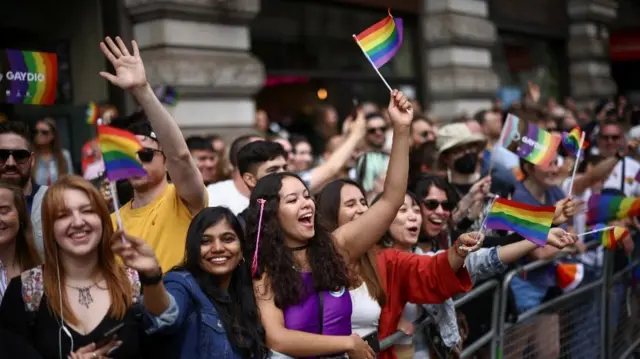 Image source, Reuters
Image source, ReutersAfter a two-year hiatus, Pride in London is back - and it was indeed bigger than ever.
While partying continues, we're going to wrap up our live coverage here for today.
Before we go, here's a recap of the day:
Thanks for joining us.
As we near the end of this year's Pride parade - and the beginning of the evening's celebrations - let's take a look at how thousands in London have marked the day:
ITV presenters Phillip Schofield, Alison Hammond, Lorraine Kelly and Linda Robson were among the famous faces spotted at today's Pride parade in London.
Stylist and fashion expert Gok Wan was also seen celebrating with Dame Kelly Holmes, who recently came out publicly as gay.
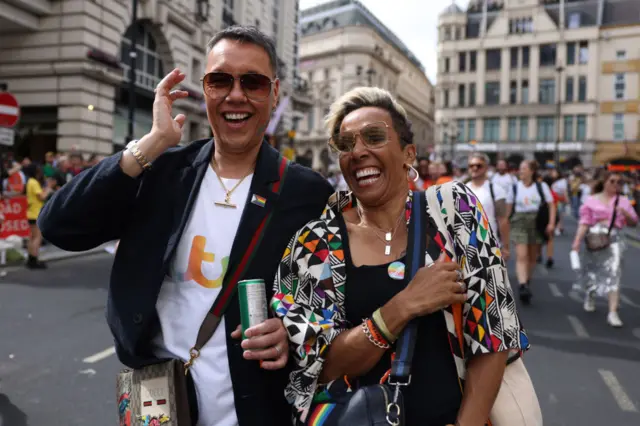 Image source, Getty Images
Image source, Getty ImagesGok Wan and Dame Kelly Holmes were captured mid-laughter during the parade
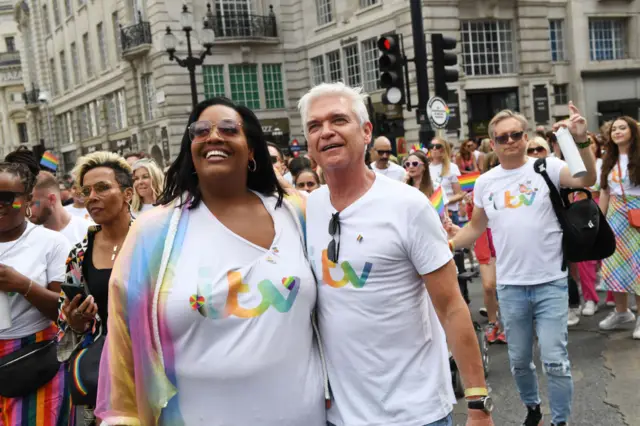 Image source, Getty Images
Image source, Getty ImagesAlison Hammond and Phillip Schofield were pictured smiling in ITV T-shirts
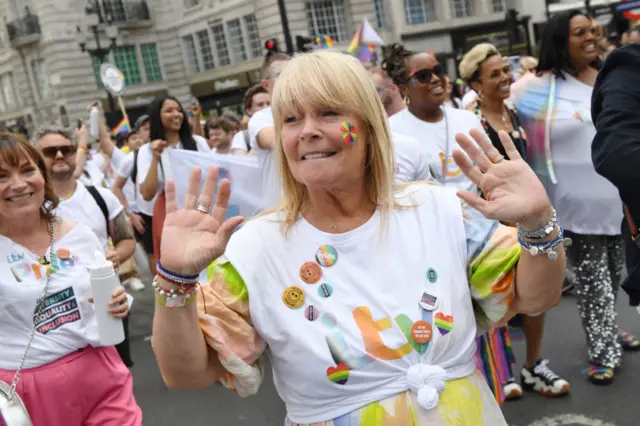 Image source, Getty Images
Image source, Getty ImagesMeanwhile, Linda Robson had been busy collecting Pride badges
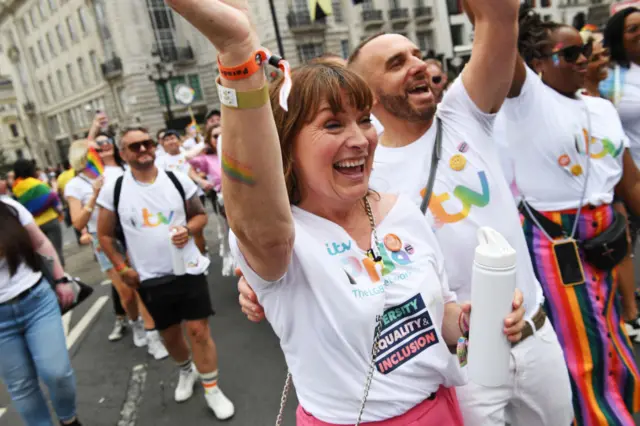 Image source, Getty Images
Image source, Getty ImagesLorraine Kelly looked delighted as she waved to onlookers
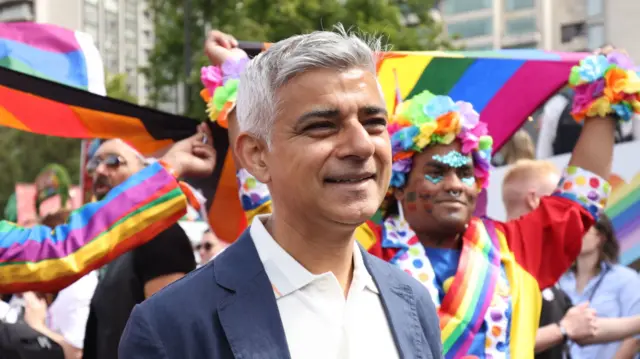 Image source, PA Media
Image source, PA MediaIt's official – this year's Pride parade was the biggest ever in the capital, the London Mayor's office says.
Sadiq Khan's office says more than one million revellers joined the event, with rainbow colours, glitter and sequins galore.
Floats lined Park Lane ahead of the main march through London, which was led by Gay Liberation Front activists holding placards saying "I was there in 1972".
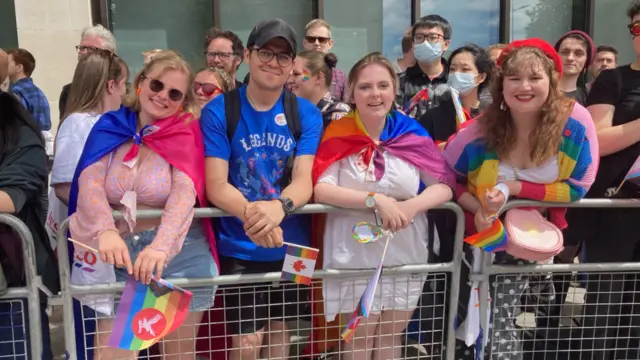
(From left to right) Octavia, Ewan, Esther, Eloisa
We've been talking to four friends attending their first Pride in London together.
Octavia says it's nice for all her friends "to be together" and to "celebrate Pride after the pandemic".
Ewan adds all four are part of the LGBTQ+ community and it's really good to see "integration" in every part of life.
"I'm having a great day," Esther chips in.
Eloisa is also happy with "how much love there is" and says "it's like we're fighting this together".
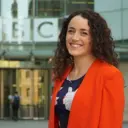 Lauren Moss
Lauren Moss
BBC LGBT & Identity Correspondent
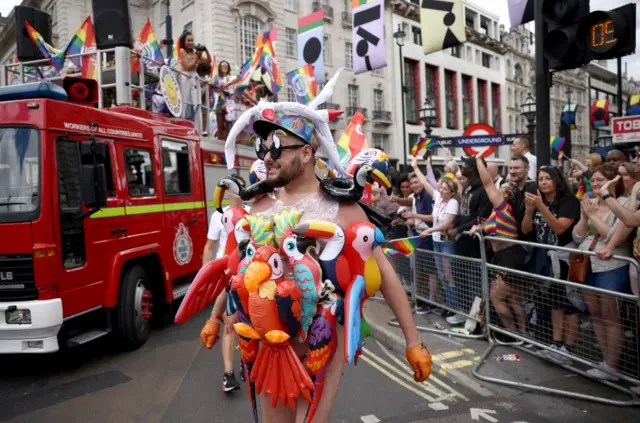 Image source, Reuters
Image source, ReutersIn 2022 Pride is most definitely a party.
People dancing in the street, throwing sweets, blowing whistles and having a great time. There’s no doubt that it’s worlds away from what it was when it started with a few hundred people risking arrest for kissing each other in the street.
These days hundreds of organisations march and the number of corporate companies on board make it very shiny and commercial. I even saw a tractor decked out in the rainbow flag!
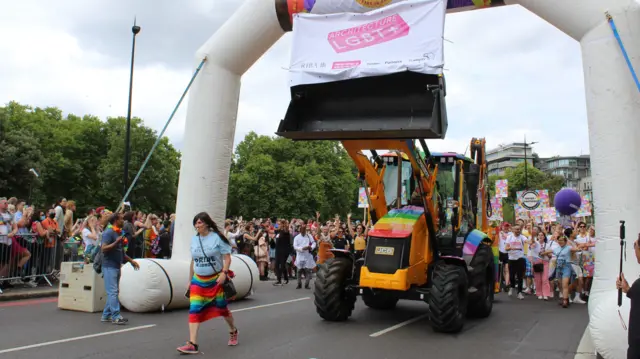
The colours are representative of bringing everyone together under one umbrella. But some within the community don’t feel it represents them, while others think it should be more of a protest like it was in 1972.
Whatever people think of it though, the capital’s streets were awash with colour today and after a month of Pride celebrations in June, they’ll continue around the country for the next several weeks.
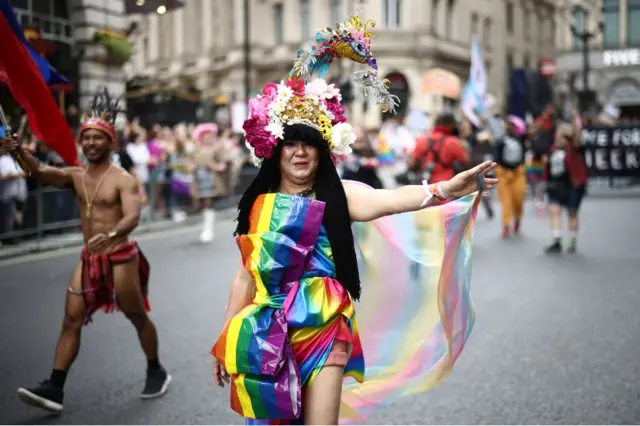 Image source, Reuters
Image source, Reuters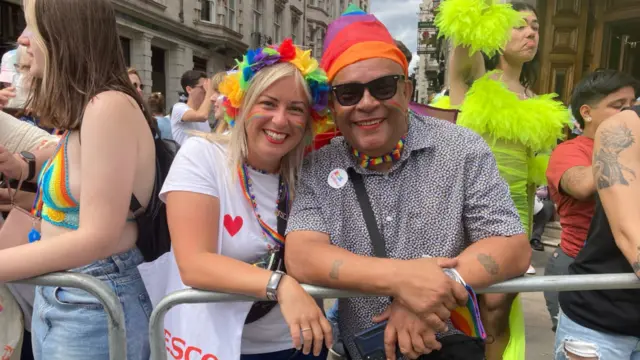
Bex and Jameson from Essex and Leytonstone
Jameson from Leytonstone says he attended his first gay pride 46 years ago and has been to around 40 events since then.
In the past there was "so much negativity and abuse", he says.
Jameson tells the BBC that 46 years ago there weren't many people, the march was lined by police officers and people who turned up faced verbal abuse and projectiles.
"By the time we'd got down to Piccadilly, I would say a third of us had got arrested," he says.
Today, however, Jameson is having a "wonderful" time at the parade.
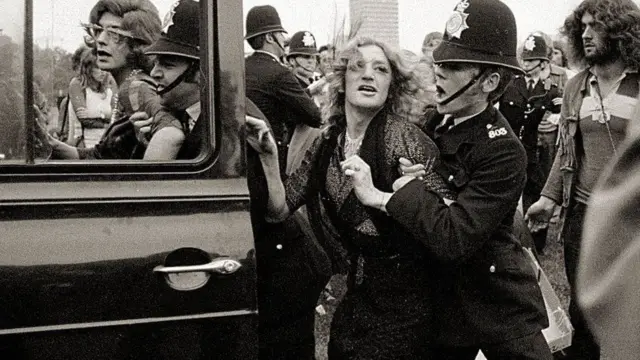 Image source, ALAMY/MIRRORPIX
Image source, ALAMY/MIRRORPIXStuart Feather (left), in drag, is bundled into a police car during a gay-rights protest, in 1971
It’s 1972 – the swinging ‘60s are over, the miners’ strike has turned off the lights and Donny Osmond is topping the charts with Puppy Love.
It will be another 20 years before same-sex attraction is declassified as a mental illness and, despite homosexual acts being decriminalised, in 1967, the age of consent remains five years older than for heterosexual couples.
But, in a basement room at the London School of Economics, a revolution is brewing.
BBC News has brought together some of those original members who attended the first UK Pride march, in 1972, and some LGBT people from the younger generation - to reflect on how much has changed and how much is still to be done.
Olympic champion Dame Kelly Holmes, who recently came out publicly as gay, has shared her excitement at being part of the celebrations for Pride in London.
She posted 'let's do this' on social media alongside the hashtag #beingme and a picture of herself wearing a multi-coloured outfit.
Dame Kelly became only the third woman in history, and the first Briton since Albert Hill 84 years earlier, to win the 800m and 1500m Olympic double at the 2004 Summer Olympics in Athens.
Allow Instagram content?
This article contains content provided by Instagram. We ask for your permission before anything is loaded, as they may be using cookies and other technologies. You may want to read Meta’s Instagram cookie policy, external and privacy policy, external before accepting. To view this content choose ‘accept and continue’.
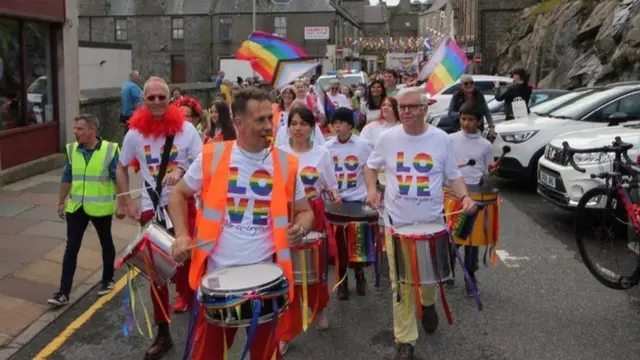 Image source, .
Image source, .It's not just London that is marking Pride today.
People in Shetland have been enjoying their first Pride festival - it's the most northerly celebration of its kind in the UK.
People from across the community joined the colourful event in Lerwick.
The event has drawn interest from across the world and visiting drag queens travelled by ferry from Aberdeen to be there.
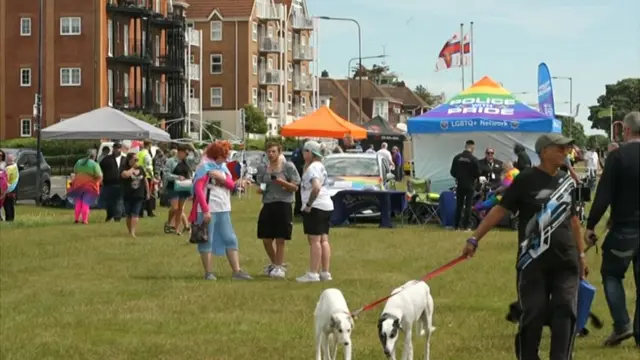 Image source, .
Image source, .Meanwhile Clacton, in Essex, is also hosting its first Pride event coinciding with the 50th anniversary of the movement globally.
The free event has been planned since September, with organiser Cheryl Piper admitting she never thought Pride would reach the town.
"It's about bringing people together; there should be no stigma," she says.
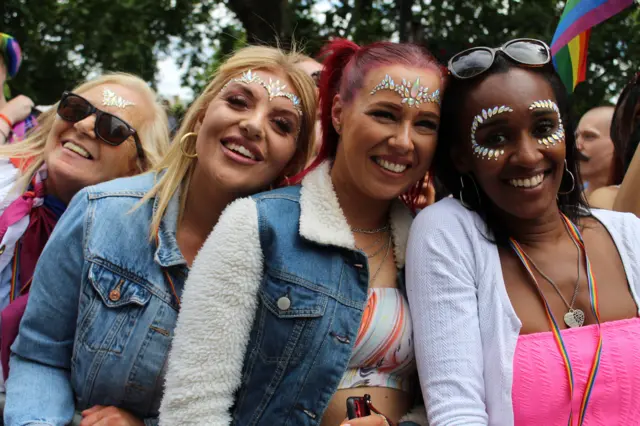
(From left to right) Siobhan, Laura and Vanessa
We’ve been speaking to revellers celebrating London’s first Pride parade for three years.
“Everyone is very happy and it’s a good day,” Laura says, adding that she’s “glad to be back”.
Siobhan describes Pride this year as “amazing” and “such a good vibe”.
Meanwhile it's Vanessa’s first time at the event in the capital.
She says she's "loving it, it's wicked." She adds it's a “really important” event for the LGBT community to show “everyone is equal.”
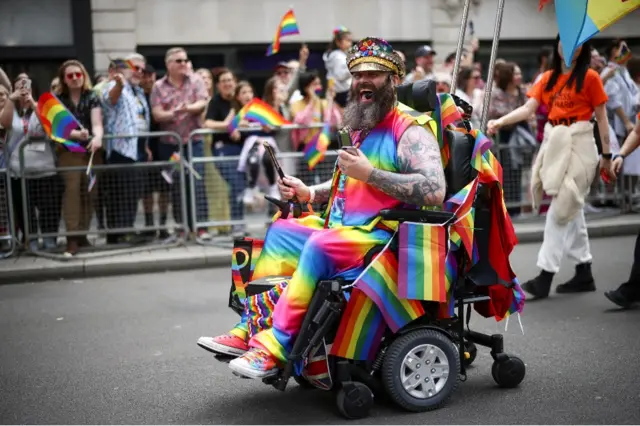 Image source, Reuters
Image source, ReutersThousands of people are in central London to enjoy this year's Pride parade. Here's some of the images which have caught our eye.
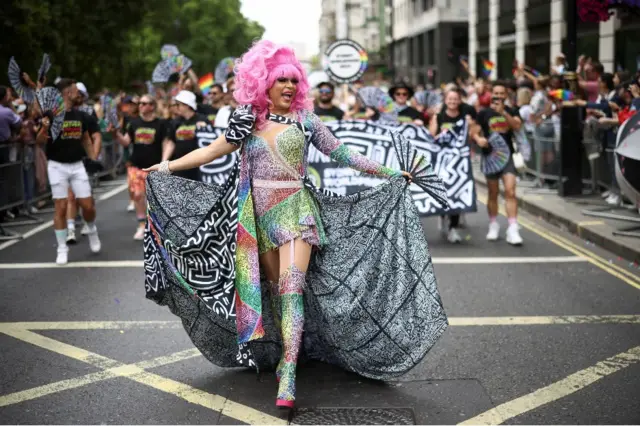 Image source, Reuters
Image source, Reuters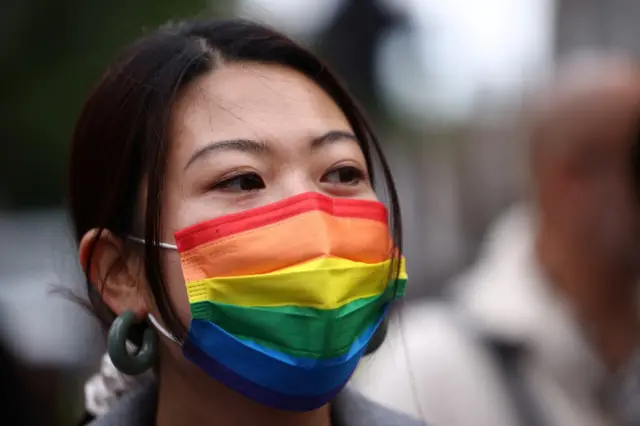 Image source, Reuters
Image source, Reuters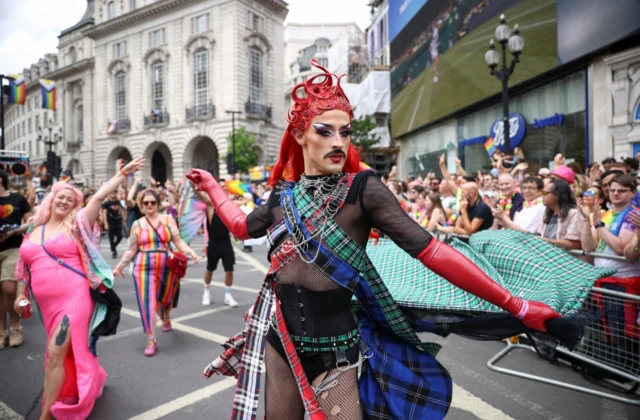 Image source, Reuters
Image source, Reuters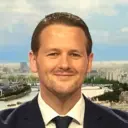 Paul Murphy-Kasp
Paul Murphy-Kasp
BBC London
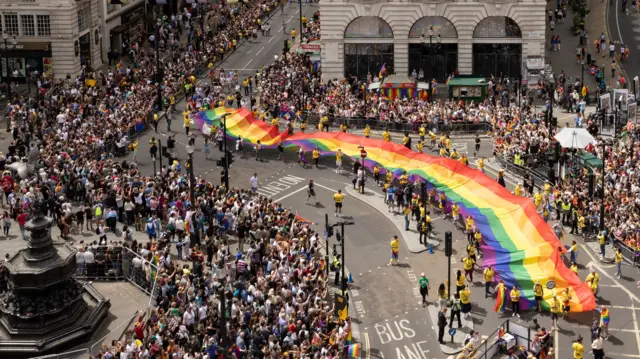 Image source, PA Media
Image source, PA MediaFor the first time since 2019, Londoners and LGBT allies from around the country have been able to turn out for the Pride parade in the capital.
I’m in the middle of the parade at the moment, and there are countless people in front of me and behind me - all marching for what they believe in. Plenty of people are watching from the side as well.
Hyde Park Corner, Piccadilly and all the way down to Trafalgar Square is lined with hundreds and maybe even thousands of people, all here to support the LGBTQ+ community.
It’s a warm, beautiful, sunny day in London, and people have certainly taken advantage of that.
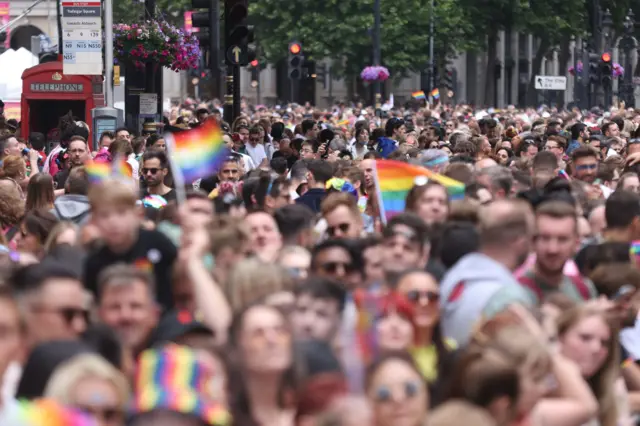 Image source, PA Media
Image source, PA Media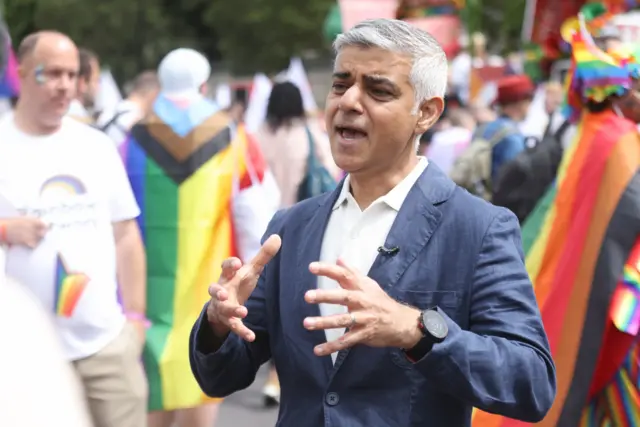 Image source, PA Media
Image source, PA MediaPolice have been "sensitive" to concerns from the LGBTQ+ community about uniformed officers taking part in this year's Pride parade, London Mayor Sadiq Khan has said.
Organisers of Pride in London have said there are “very real concerns” within the LGBTQ+ community about “police homophobia” and have asked police officers wearing uniforms not to join.
In previous years officers from the Metropolitan Police have taken part in the parade in their work clothing.
Khan said "clearly" the LGBTQ+ community had concerns around policing, referencing the investigation into the murders of four gay men by serial killer Stephen Port.
He added: "I think the police have been sensitive to the issues raised by the community and there will be uniformed officers in and around Pride to make sure we're all safe, to make sure this parade is a success.
"But, clearly, those taking part in the parade from the police service won't be wearing the uniforms."
In June it was announced the police watchdog would reinvestigate the Metropolitan Police's initial handling of the men murdered by Port.
 Lauren Moss
Lauren Moss
BBC LGBT & Identity Correspondent
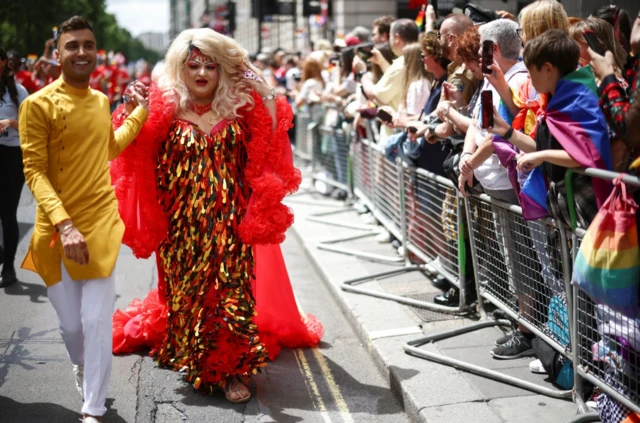 Image source, Reuters
Image source, ReutersIf anyone was in any doubt - Pride is loud and proud and back in 2022.
The streets of London are awash with rainbow colours celebrating the LGBT+ community.
It set off a little later than planned, but the Gay Liberation Front - who organised the first protest in 1972 of several hundred people - led the way again setting off on a bus from underneath the inflatable archway at Hyde Park Corner.
An enormous rainbow flag billows out behind them along with thousands of people who want to make their voices heard at the place where Pride was born 50 years ago.
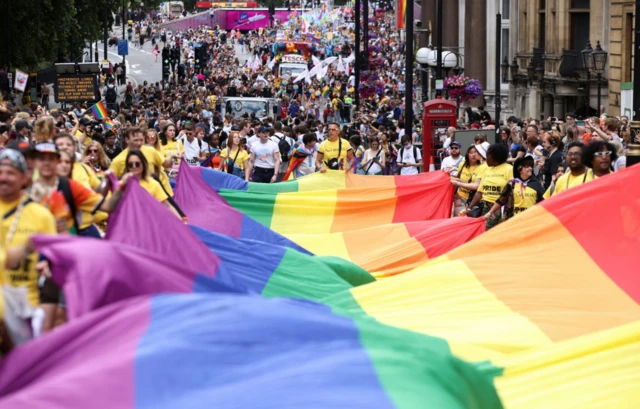 Image source, Reuters
Image source, Reuters Paul Murphy-Kasp
Paul Murphy-Kasp
BBC London
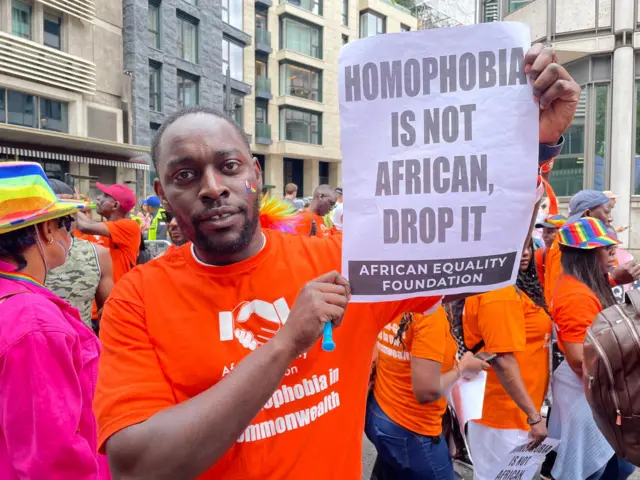
Kevin from Uganda said he was "so, so, so happy" to come to Pride in London
Kevin from Uganda says he's "so, so, so happy" to come to Pride in London and "support the LGBT community".
"I'm proud to be a gay man," he says, adding that he is "really happy" to be celebrating Pride after two years of cancellations because of the pandemic.
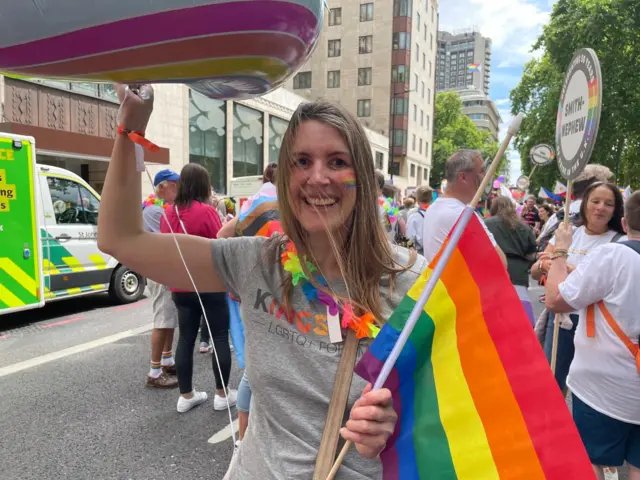
Helene from Surbiton, south-west London, said she plans to high-five everyone supporting the parade
Helene from Surbiton, in south-west London, told the BBC she plans to high-five everyone supporting the parade.
She says sexual orientation "is nobody's business but your own".
Fifty years ago about 2,000 people took part in London's first official Lesbian and Gay Pride event, as part of a protest against how the police treated that community.
The marches have continued to this day, but now the hundreds of thousands of people who take to the streets are joined by celebrities, corporate sponsors and politicians.
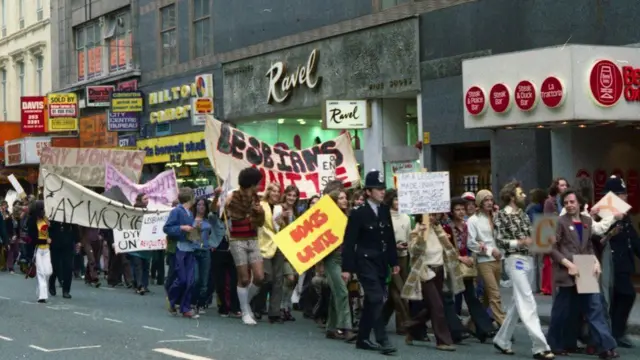 Image source, PETER TATCHELL / JAMIE GARDINER
Image source, PETER TATCHELL / JAMIE GARDINERThe first Lesbian and Gay Pride marches through central London
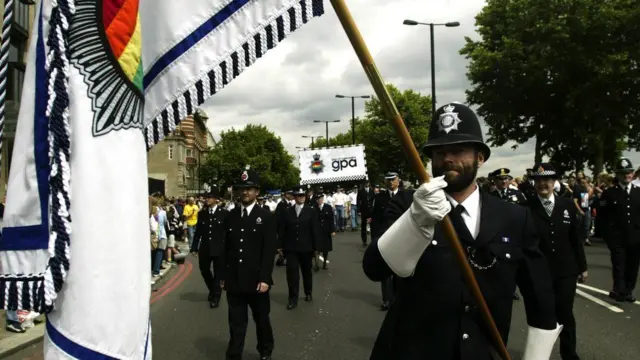 Image source, Getty Images
Image source, Getty ImagesPolice officers weren't allowed to march in uniform at Pride until 2003
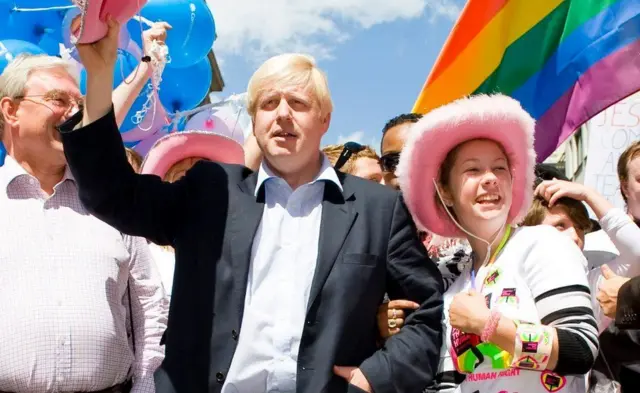 Image source, Getty Images
Image source, Getty ImagesPrime Minister Boris Johnson, then London mayor, at the 2008 Pride march
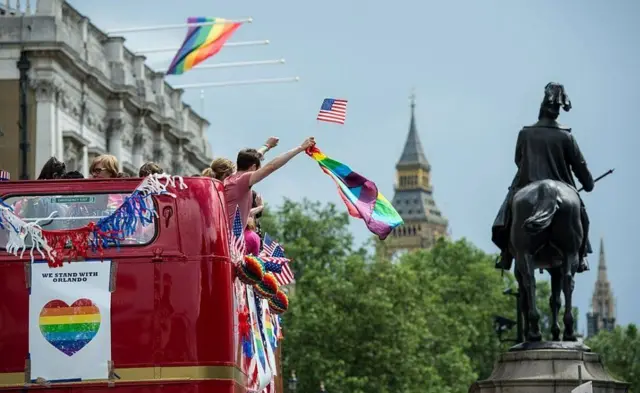 Image source, Getty Images
Image source, Getty ImagesPride in London 2016 was a poignant affair as people remembered those who died in the Pulse nightclub shooting in Florida a few days before
Pride in London has evolved over the years, with some questioning its priorities.
However, the message of fairness, equality and inclusivity has been a constant.
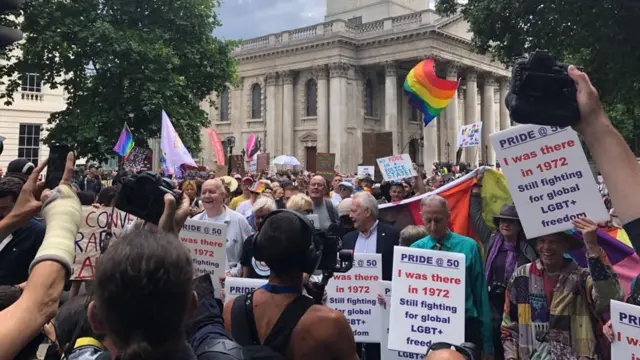
Peter Tatchell, pictured wearing a green shirt, took part in an event in central London on Friday marking the 50th anniversary of Pride
Police officers wearing uniforms have been asked not to join today’s annual London Pride march.
Organisers say there are “very real concerns” within the LGBTQ+ community about “police homophobia”.
If follows accusations by campaigners of “very serious evidence of police homophobia" within the Met Police, especially over its handling of four murders of gay men by Stephen Port.
The Met said it recognised some incidents had "damaged trust and confidence in policing".
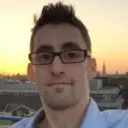 Rob Oxley
Rob Oxley
BBC Radio London
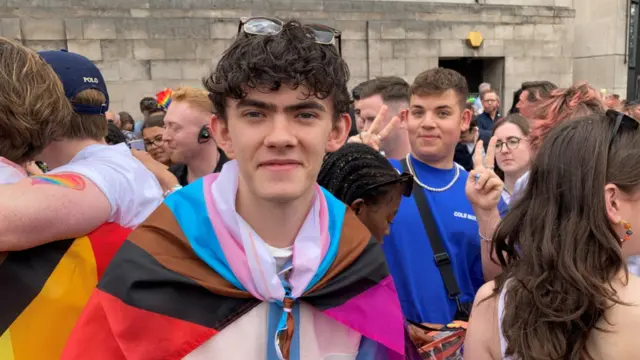
Star of Netflix series Heartstopper Joe Locke says he's attending his first pride
At the front of the parade, behind the giant Pride flag, are the cast of the Netflix series Heartstopper.
The drama's star Joe Locke says it’s his first Pride and it's "such an honour" to be celebrating "being queer when the world might not be so accepting".
"It’s very, very surreal for me,” he says.